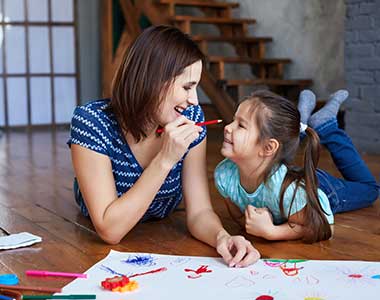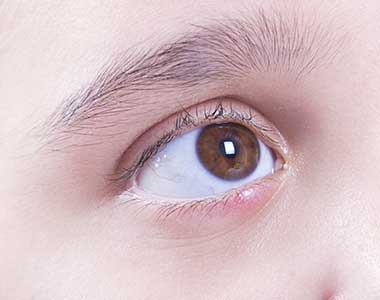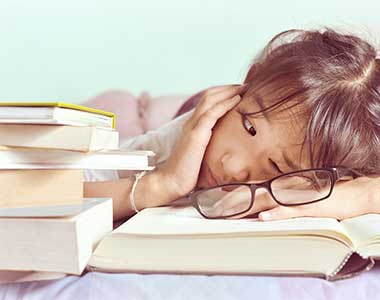Balancing the Body & Mind

The notion that our mind, emotions, and body play a significant role in our health is far from new. Modern day science continues to prove this theory and has demonstrated that our thoughts and emotions play a critical role in all aspects of our health. This means that by taking care of our psychological well-being, we may be able to prevent medical illness or speed our recovery when we are sick. This balance is as important for adults than for children.
Our different emotional states ranging from love and happiness to anger and anxiety can cause chain reactions that affect our blood chemistry, heart rate and the activity of every cell and organ in the body which can influence structures such as our gastrointestinal tract and immune system. Our thoughts and emotions can also affect our body's response to stressors, which can cause physical problems such as aches and pains, disturbed sleep, low energy, headaches, heart palpitations, upset stomach or weight gain or loss. These physical symptoms are signs that our emotional health is out of balance. By paying attention to our emotional and mental states, we can help ourselves stay healthy. By teaching our kids how to maintain this healthy balance you can help them avoid many physical symptoms in the future.
Best habits for a healthy mind in a healthy body
- Daily Physicality: include physical activity on a daily basis in their routine as it will help in stress reduction and the normal cognitive functioning of your child. Get them used to sports from early age so they can carry on this activity later in their adult life and adopt it as part of their lifestyle. It’s very important that parents take part of their physical activities as supporters and role models
- Healthy coping mechanisms: teach your children about healthy coping mechanisms when dealing with anger, frustration and negative emotions. Uncontrolled anger can lead to heart problems. People with problems coping with their anger or aggravation were found to be at ten times heightened risk for future heart arrhythmias than those without such anger problems. Those coping mechanisms can be taught early in childhood. Those coping mechanisms can be: breathing, jumping or running, stepping out of the room, listening to music, reading a book, coloring…
- Social life: support your children in creating and maintaining close-knit human bonds and a social support network. studies suggest that giving social support to others may benefit the brain areas of the giver more than the receiver on a neurobiological level. and thus the brain
- Bonding: The importance of unconditional love, attention and sense of security at home and in the relationships with parents, are essential for a healthy child. When absent child might develop psychosomatic symptoms like stomach pain, and headaches. Without bonding and healthy relations at home the child might develop poor self-confidence, poor trust in others, a clingy personality, and some difficulties in social skills.
- Visualization: Teach your child techniques of visualization to help in the stress level and the anxiety. In our bodies, the central nervous system executes orders both automatically and at times through the command of the mind. For example, our hearts operate automatically without any orders from our mind. But an individual can change the functioning of their heart, either slowing or accelerating their heartbeat through visualization exercises in their minds. If an individual becomes frightened his heartbeat accelerates. If they meditate their heartbeat slows down. Certain automatic body functions can be adjusted this way by the mind. Visualization is a mental image that people create in their head for a certain purpose. Parents can teach their children visualization by asking them to close their eyes and imagine a moment that would be very fun. Then parents can ask their child to describe the image, then to describe how they are feeling in this image.
Conclusion
Balancing mind and body starts early in childhood to become part of your child’s lifestyle in adulthood. Physically fit means keeping mentally fit as well. That means finding healthy ways to deal with what psychologists would typically call “negative emotions” — such as anger, aggression, aggravation, fear, etc. — and reinforcing the positive emotions and behaviours in our life. It means finding ways to communicate with the loved ones in our lives, rather than bottling it all up inside and letting it simmer. It means getting enough quality sleep each and every night and finding positive ways to relieve stress as you encounter it. Physical activity is a great tool to use a stress reliever. Writing, drawing is also another healthy tool for stress relieve. Any time parents see their children stressed have the habit to use those coping mechanisms, with them. It’s also very important for parents to be the right role model in using healthy coping mechanisms and balancing mind and body as children watch them.
As a mother you are always thriving on giving the best elements of life to your child. Nutrition is an essential element in maintaining a healthy kid both mentally and physically. New NIDO Fortified with FortiGrow is the milk nutrition that helps support your child’s excelling mind. It provides an optimized blend of key essential nutrients (Protein, Iron, Zinc, B-Vitamins, Calcium, Vitamin A, Vitamin C and Vitamin D) that are scientifically proven to support your child’s overall growth, cognitive development and mental alertness.
References
- https://www.psychologytoday.com/blog/the-athletes-way/201602/3-specific-ways-helping-others-benefits-your-brain
- https://www.psychologytoday.com/blog/the-athletes-way/201302/7-habits-healthy-mind-in-healthy-body
- http://psychcentral.com/blog/archives/2009/02/25/the-connection-between-mental-physical-health/
- http://www.behavioralhealthmn.com/mind-body/













 Parenting Articles
Parenting Articles

